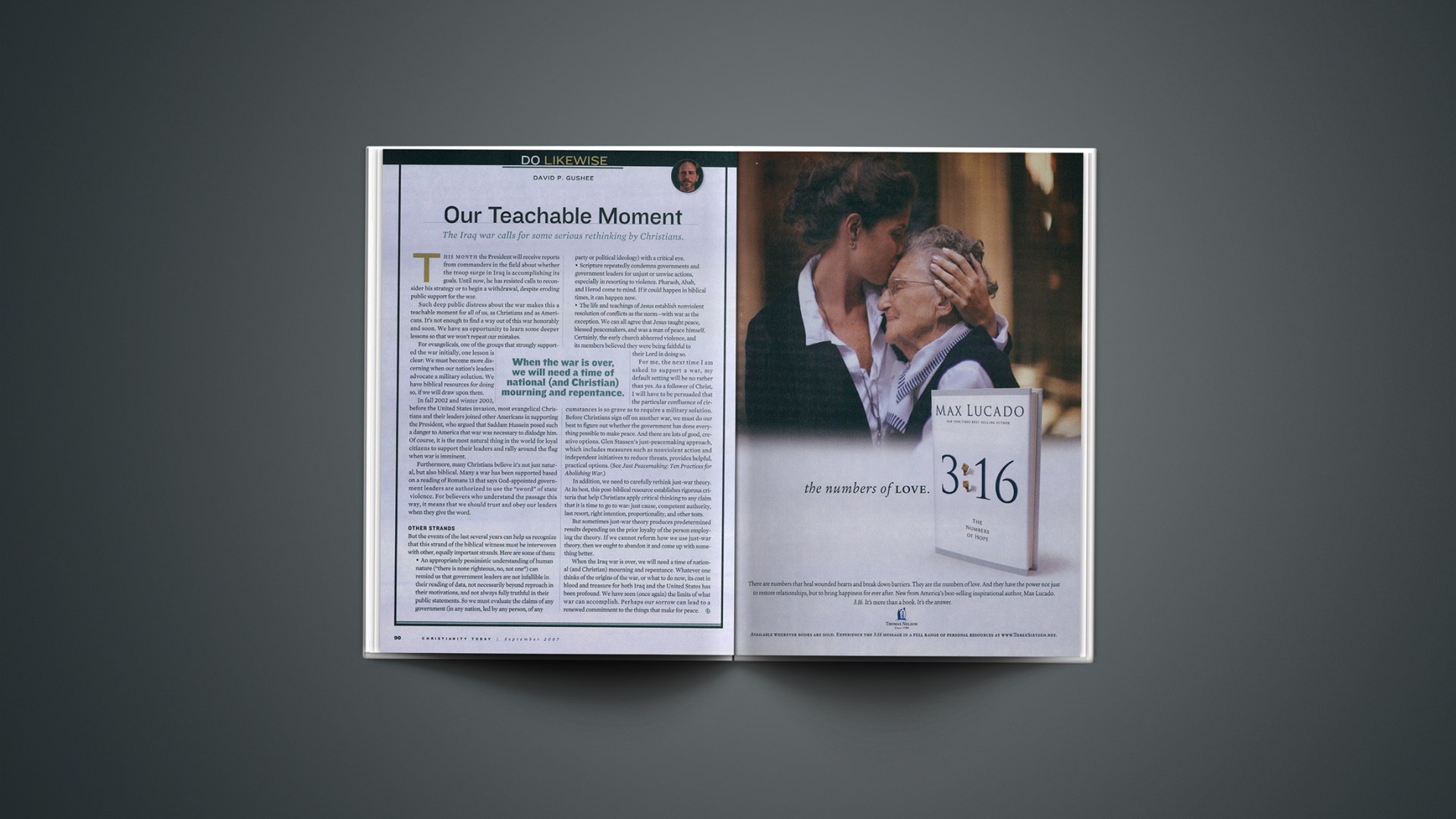This month the President will receive reports from commanders in the field about whether the troop surge in Iraq is accomplishing its goals. Until now, he has resisted calls to reconsider his strategy or to begin a withdrawal, despite eroding public support for the war.
Such deep public distress about the war makes this a teachable moment for all of us, as Christians and as Americans. It’s not enough to find a way out of this war honorably and soon. We have an opportunity to learn some deeper lessons so that we won’t repeat our mistakes.
For evangelicals, one of the groups that strongly supported the war initially, one lesson is clear: We must become more discerning when our nation’s leaders advocate a military solution. We have biblical resources for doing so, if we will draw upon them.
In fall 2002 and winter 2003, before the United States invasion, most evangelical Christians and their leaders joined other Americans in supporting the President, who argued that Saddam Hussein posed such a danger to America that war was necessary to dislodge him. Of course, it is the most natural thing in the world for loyal citizens to support their leaders and rally around the flag when war is imminent.
Furthermore, many Christians believe it’s not just natural, but also biblical. Many a war has been supported based on a reading of Romans 13 that says God-appointed government leaders are authorized to use the “sword” of state violence. For believers who understand the passage this way, it means that we should trust and obey our leaders when they give the word.
Other Strands
But the events of the last several years can help us recognize that this strand of the biblical witness must be interwoven with other, equally important strands. Here are some of them:
- An appropriately pessimistic understanding of human nature (“there is none righteous, no, not one”) can remind us that government leaders are not infallible in their reading of data, not necessarily beyond reproach in their motivations, and not always fully truthful in their public statements. So we must evaluate the claims of any government (in any nation, led by any person, of any party or political ideology) with a critical eye.
- Scripture repeatedly condemns governments and government leaders for unjust or unwise actions, especially in resorting to violence. Pharaoh, Ahab, and Herod come to mind. If it could happen in biblical times, it can happen now.
- The life and teachings of Jesus establish nonviolent resolution of conflicts as the norm—with war as the exception. We can all agree that Jesus taught peace, blessed peacemakers, and was a man of peace himself. Certainly, the early church abhorred violence, and its members believed they were being faithful to their Lord in doing so.
For me, the next time I am asked to support a war, my default setting will be no rather than yes. As a follower of Christ, I will have to be persuaded that the particular confluence of circumstances is so grave as to require a military solution. Before Christians sign off on another war, we must do our best to figure out whether the government has done everything possible to make peace. And there are lots of good, creative options. Glen Stassen’s just-peacemaking approach, which includes measures such as nonviolent action and independent initiatives to reduce threats, provides helpful, practical options. (See Just Peacemaking: Ten Practices for Abolishing War.)
In addition, we need to carefully rethink just-war theory. At its best, this post-biblical resource establishes rigorous criteria that help Christians apply critical thinking to any claim that it is time to go to war: just cause, competent authority, last resort, right intention, proportionality, and other tests.
But sometimes just-war theory produces predetermined results depending on the prior loyalty of the person employing the theory. If we cannot reform how we use just-war theory, then we ought to abandon it and come up with something better.
When the Iraq war is over, we will need a time of national (and Christian) mourning and repentance. Whatever one thinks of the origins of the war, or what to do now, its cost in blood and treasure for both Iraq and the United States has been profound. We have seen (once again) the limits of what war can accomplish. Perhaps our sorrow can lead to a renewed commitment to the things that make for peace.
Copyright © 2007 Christianity Today. Click for reprint information.
Related Elsewhere:
Gushee’s columns are available online.
For more coverage on the Iraq conflict, commentary and thought on just war, or Christian debate, see our CT War in Iraq archive.










